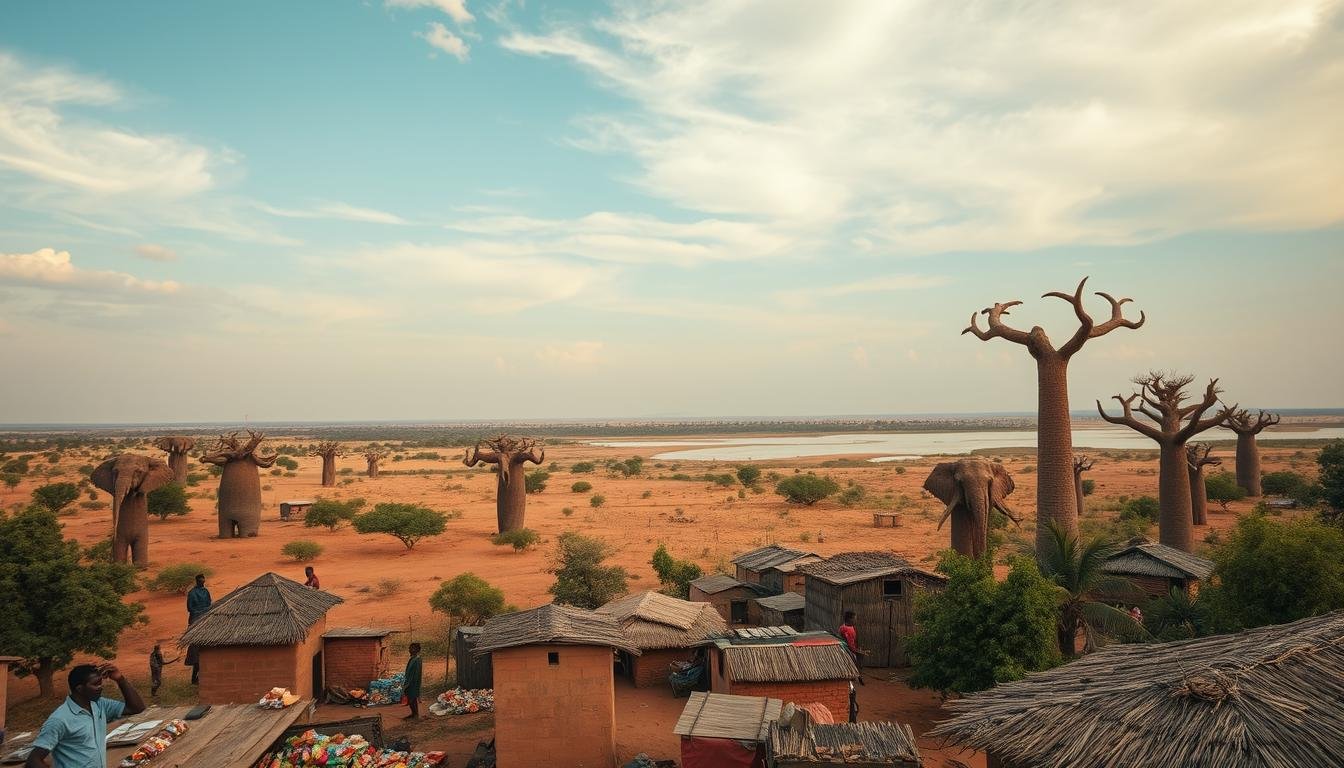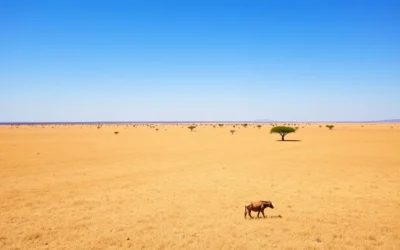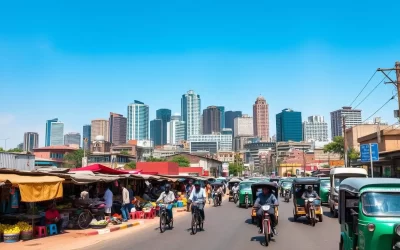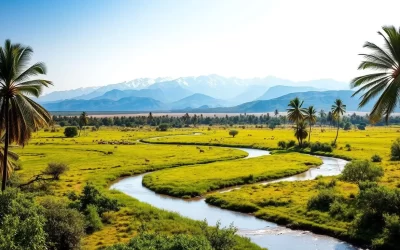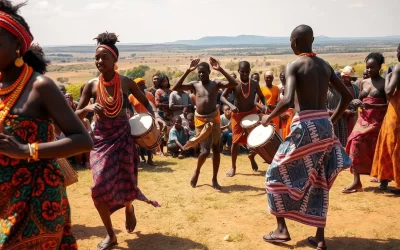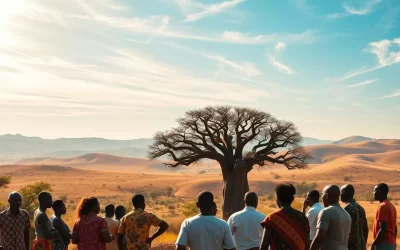✓ Accommodations✓ Flights✓ Rental Cars
Did you know that South Sudan is the newest country in Africa, gaining independence in 2011? This vibrant nation offers a unique blend of cultural richness and natural wonders. From its remarkable wildlife migrations to its evolving financial systems, there’s much to explore.
Traveling here means stepping into a world where tradition meets modernity. The local currency, the South Sudanese pound, plays a key role in daily transactions. Yet, understanding the financial landscape can enhance your journey.
This guide will help you navigate the essentials, ensuring a smooth and enriching experience. Whether you’re drawn by the culture or the adventure, South Sudan promises unforgettable moments.
Introduction: Why Visit South Sudan?
Discover a hidden gem in Africa, where adventure and culture intertwine. This country offers a blend of breathtaking landscapes and warm, welcoming people. From vast wetlands to rugged mountains, every corner tells a story of resilience and beauty.
Unveiling South Sudan’s Unique Attractions
South Sudan is home to some of the most remarkable natural wonders. The Sudd wetlands, one of the largest freshwater ecosystems, are a haven for wildlife. The Imatong Mountains offer stunning views and challenging hikes for outdoor enthusiasts.
This area is also rich in cultural diversity. With over 60 ethnic groups, each with unique traditions, you’ll experience vibrant expressions of art, music, and dance. The locals are known for their hospitality, making you feel like a part of their community.
The Adventure That Awaits You
For those seeking adventure, South Sudan delivers. Witness the second-largest animal migration on Earth in Boma National Park. Encounter elephants, giraffes, and antelopes in their natural habitat.
The best time to visit is during the dry season, from November to April. This period ensures easier travel and optimal wildlife viewing. Whether you’re exploring wetlands or meeting local tribes, every moment here is unforgettable.
“South Sudan is a place where nature and humanity coexist in harmony, offering a truly unique experience.”
From its untamed wilderness to its vibrant culture, this country invites you to explore its wonders. Pack your bags and get ready for an adventure like no other.
Discovering South Sudan’s Cultural and Financial Landscape
Exploring the cultural and financial landscape of this young nation reveals a fascinating blend of tradition and modernity. The country’s rich ethnic diversity plays a significant role in shaping its commerce and financial practices. From bustling city markets to rural trading hubs, every transaction tells a story of cultural heritage.
Diverse Ethnic Influences on Commerce
With over 60 ethnic groups, the nation’s commerce is deeply rooted in its cultural diversity. Each community brings unique traditions to the marketplace, influencing how goods are traded and valued. In the city, modern financial systems coexist with age-old practices, creating a dynamic economic environment.
For example, some communities prefer barter systems, while others embrace cash transactions. This blend of old and new reflects the resilience and adaptability of the people. Understanding these nuances can enrich your travel experience and help you navigate local markets with ease.
Local Traditions and Payment Customs
Local payment customs are as diverse as the communities themselves. In rural areas, you might encounter traditional methods like livestock exchange or handshake agreements. In contrast, urban centers often rely on cash or emerging digital payment options.
Here’s some practical advice: Always carry small denominations of the local currency when shopping in markets. Many vendors may not have change for larger bills. Additionally, be respectful of local customs when negotiating prices. A friendly demeanor can go a long way in building trust.
“In this country, every transaction is more than just an exchange of goods—it’s a cultural exchange.”
By embracing these traditions, you’ll not only enjoy a smoother travel experience but also gain a deeper appreciation for the local way of life. Whether you’re applying for a visa or exploring markets, understanding these customs will make your journey more meaningful.
Understanding South Sudanese Currency
Understanding the local currency is key to navigating financial transactions during your trip. The South Sudanese pound (SSP) has been the official currency since the nation’s independence in 2011. Its evolution reflects the country’s economic journey and resilience.
History of the South Sudanese Pound
The South Sudanese pound was introduced in 2011, replacing the Sudanese pound. This marked a significant milestone in the nation’s economic independence. The currency’s design features symbols of national pride, including wildlife and cultural motifs.
Over the years, the SSP has faced challenges due to economic and political factors. Despite this, it remains a vital part of daily life. Its stability is crucial for both locals and visitors, especially in urban centers like Juba.
Exchange Rates and Real-World Tips
Exchange rates for the South Sudanese pound fluctuate based on economic conditions. As of September 2024, the black market rate is only 10% higher than the official rate. This makes it essential to monitor rates before exchanging money.
Here are some practical tips for managing your finances during your trip:
- Carry small denominations for easier transactions in markets and rural areas.
- Use prepaid travel cards to avoid high fees on currency exchange.
- Compare rates using tools like Monito to find the best deals.
In urban settings, such as hotels, card payments are becoming more common. However, cash remains the preferred method in rural places. Always plan ahead to ensure smooth financial transactions.
| Currency | Exchange Rate (SSP) | Usage |
|---|---|---|
| USD | 1 USD = 500 SSP | Widely accepted in hotels and urban areas |
| EUR | 1 EUR = 550 SSP | Less common, mainly in tourist places |
| GBP | 1 GBP = 600 SSP | Rarely used, exchange at banks |
By understanding the local currency and exchange dynamics, you can make the most of your trip. Whether you’re staying in a hotel or exploring rural places, these insights will help you navigate financial transactions with ease.
Payment Methods in South Sudan’s Urban and Rural Areas
Navigating payment methods in this vibrant nation reveals a stark contrast between urban and rural areas. While bustling cities embrace modern options, remote regions still rely heavily on traditional practices. Understanding these differences ensures a smoother travel experience.
Cash and Card Usage
Cash remains the dominant payment method, especially in rural areas. Many roads are unpaved, making it challenging for digital infrastructure to reach remote places. Local markets and small vendors often prefer cash transactions due to limited access to banking services.
In urban centers, card payments are gradually becoming more common. Major hotels, restaurants, and supermarkets accept credit and debit cards. However, ATMs are unreliable and often dispense only local currency. It’s wise to carry sufficient cash for your day-to-day expenses.
Digital Payment Emerging Trends
Digital payment methods are slowly gaining traction, particularly in cities. Mobile money services are improving, offering a convenient alternative to cash. These services are especially useful for travelers who want to avoid carrying large amounts of money.
Despite these advancements, challenges remain. Limited internet access and a lack of interoperability hinder widespread adoption. However, the government is working to enhance digital infrastructure, signaling a promising future for electronic payments.
Here are some practical tips for managing your money:
- Carry small denominations for easier transactions in markets and rural areas.
- Use prepaid travel cards to avoid high fees on currency exchange.
- Keep an eye on emerging digital payment services for added convenience.
| Payment Method | Urban Areas | Rural Areas |
|---|---|---|
| Cash | Common, but card usage is increasing | Dominant, especially in local markets |
| Cards | Accepted in hotels and supermarkets | Rarely used due to limited infrastructure |
| Digital Payments | Emerging, with mobile money services | Limited due to poor internet access |
By understanding these payment dynamics, you can navigate financial transactions with ease. Whether you’re exploring urban centers or remote villages, being prepared ensures a hassle-free experience.
South Sudan: Ultimate Travelers Guide to Currencies & Payments Essentials
Managing your finances effectively is crucial when traveling to a new destination. Understanding the local financial landscape can save you time and ensure a smoother experience. This section provides essential tips to help you navigate money matters with confidence.
Essential Money Matters for Travelers
When crossing the border, it’s important to carry sufficient cash in small denominations. Many remote areas lack ATMs, and vendors may not accept cards. Keep some local currency handy for immediate needs like transportation or meals.
Government regulations play a significant role in currency handling. It’s illegal to import or export local currency, so ensure you exchange your money at official bureaus. These institutions offer reliable rates and can help you avoid scams.
Unexpected costs can arise during your travel time. Always budget for emergencies, such as sudden price changes or additional fees. Keeping a separate fund for such situations can provide peace of mind.
Here are some practical tips to manage your money effectively:
- Use a money belt or hidden pouch to keep your funds safe while on the move.
- Carry a mix of cash and prepaid travel cards for flexibility.
- Visit official exchange bureaus or banks for the best rates and secure transactions.
By following these strategies, you’ll be well-prepared to handle financial challenges during your trip. Whether you’re crossing the border or exploring local markets, these tips will help you stay in control of your finances.
Budgeting and Cost Management
Planning your budget wisely can make your trip to this unique region both enjoyable and affordable. Understanding daily expenses and knowing how to stretch your funds will help you make the most of your journey. Whether you’re exploring bustling cities or remote villages, these tips will ensure you stay on track financially.

Daily Expense Breakdown
Daily costs can vary significantly depending on your location. In urban areas, expect to spend more on lodging and dining, while rural regions often offer more affordable options. Here’s a quick guide to typical daily expenses:
| Expense | Urban Areas (SSP) | Rural Areas (SSP) |
|---|---|---|
| Meals | 2,000 – 5,000 | 1,000 – 2,500 |
| Lodging | 10,000 – 20,000 | 5,000 – 10,000 |
| Transport | 1,500 – 3,000 | 500 – 1,500 |
| Activities | 3,000 – 7,000 | 1,000 – 3,000 |
These estimates can help you plan your daily budget. Keep in mind that costs may fluctuate based on the season and local demand.
Strategies to Stretch Your Budget
Traveling on a budget doesn’t mean missing out on experiences. Here are some practical tips to maximize your funds:
- Choose local eateries: Street food and small restaurants often offer delicious meals at a fraction of the cost.
- Opt for shared transport: Buses and boda-bodas are cheaper than private taxis and provide a chance to interact with locals.
- Stay in guesthouses: These are more affordable than hotels and often provide a more authentic experience.
- Plan ahead: Research activities and compare prices to avoid unexpected costs.
By following this guide, you can enjoy your trip without overspending. Remember, a little planning goes a long way in making your journey memorable and budget-friendly.
How to Get There: Currency Exchange and Payment Preparation
Preparing for your journey involves more than just packing your bags; it’s about understanding the financial landscape. From visa fees to exchanging currency, careful planning ensures a smooth start to your trip. Here’s what you need to know to handle money matters effectively.
Visa and Immigration Payment Tips
Applying for a visa is often the first step in your travel activity. Most countries require a fee, which can vary depending on your nationality and the type of visa. For example, in recent years, visa fees have ranged from $50 to $150 for short-term stays.
Here’s a quick checklist to help you navigate the process:
- Gather required documents: Passport, photos, and proof of accommodation are commonly needed.
- Pay the visa fee: Use secure payment methods like credit cards or bank transfers.
- Check processing times: Apply well in advance to avoid last-minute stress.
At immigration, you may need to show proof of sufficient funds for your stay. Carry a mix of cash and cards to meet this requirement.
Pre-Travel Currency Exchange Advice
Exchanging currency before your trip can save you time and money. Start by researching the current exchange rates using reliable tools like XE Currency Converter or OANDA. These platforms provide real-time data, ensuring you get the best deal.
Here are some practical tips for exchanging money:
- Compare rates: Banks and specialized exchange services often offer better rates than airports.
- Carry small denominations: This makes transactions easier, especially in rural areas.
- Use prepaid travel cards: These are secure and can be reloaded as needed.
Planning your currency exchange activity ahead of time ensures you’re prepared for any financial situation during your trip.
| Currency Exchange Option | Pros | Cons |
|---|---|---|
| Banks | Reliable rates, secure transactions | May require advance booking |
| Airport Kiosks | Convenient, available 24/7 | Higher fees and less favorable rates |
| Online Services | Competitive rates, easy to use | Delivery times may vary |
By following these tips, you’ll be well-prepared to handle financial matters before and during your trip. Whether you’re applying for a visa or exchanging currency, a little planning goes a long way in ensuring a hassle-free experience.
Transportation and Payment Challenges
Getting around in this dynamic region can be both exciting and challenging. From bustling cities to remote villages, transportation options vary widely. Understanding how to pay for rides and handle unexpected costs will make your journey smoother.
Taxis, Boda-Bodas, and Bus Payments
Taxis are a popular choice in urban areas. They offer convenience but often require cash payments. Negotiating fares beforehand is essential to avoid misunderstandings. In rural areas, boda-bodas (motorcycle taxis) are common. These are cheaper but less comfortable.
Buses are ideal for group travel, especially for longer distances. Payment is usually made directly to the conductor. Always confirm the fare before boarding to avoid disputes. Carrying small denominations of local currency is recommended for all transport options.
Dealing with Roadblock Fees and Unplanned Costs
Roadblocks are a frequent challenge, especially in rural areas. These may involve unexpected fees or delays. Having some extra cash on hand can help you navigate these situations smoothly. Avoid carrying large amounts of money to reduce the risk of theft.
Here are some strategies to manage unplanned costs:
- Carry a mix of cash and cards: While cash is preferred, having a card as backup can be useful in emergencies.
- Negotiate fares upfront: Whether you’re taking a taxi or joining a group bus, clarity in payment discussions is key.
- Plan for contingencies: Set aside a small fund for unexpected expenses like roadblock fees.
| Transport Option | Payment Method | Tips |
|---|---|---|
| Taxi | Cash | Negotiate fare before the ride |
| Boda-Boda | Cash | Use for short distances only |
| Bus | Cash to conductor | Confirm fare before boarding |
By understanding these payment dynamics, you’ll be better prepared to handle transportation challenges. Whether you’re taking a taxi or joining a group bus, these tips will ensure a hassle-free experience.
Where to Stay: Currency Insights for Every Budget
Choosing the right place to stay can make or break your travel experience. Accommodation options vary widely, from luxurious hotels to cozy guesthouses. Understanding the payment methods for each type ensures a smooth and stress-free stay.
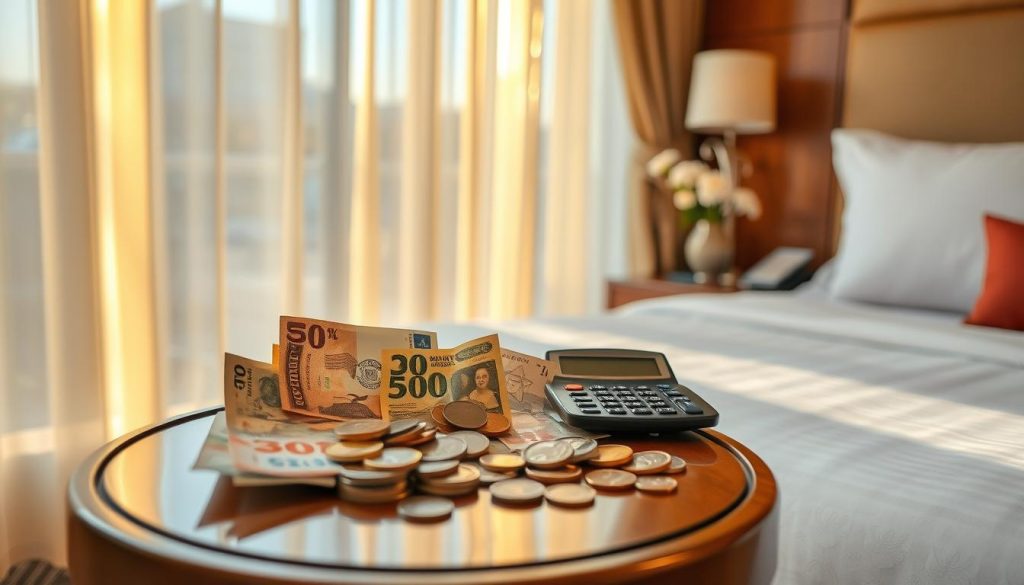
Hotel Payment Options
High-end hotels often offer multiple payment options, including credit cards and digital payments. These establishments cater to international travelers, making it easier to manage your finances. However, it’s always a good idea to verify accepted methods before booking.
Here’s what you should expect:
- Card payments: Most upscale hotels accept major credit and debit cards.
- Digital wallets: Some hotels are adopting mobile payment solutions for added convenience.
- Cash: While less common, some hotels may still accept cash, especially in smaller cities.
Always confirm the payment policy to avoid surprises. This way, you can focus on enjoying your stay without worrying about financial hiccups.
Guesthouses and Local Lodgings
Guesthouses and local lodgings provide a more authentic experience. These options are often budget-friendly but may have limited payment methods. Cash is the most widely accepted form of payment in these settings.
Here are some tips for managing payments:
- Carry small bills: Many guesthouses may not have change for larger denominations.
- Verify in advance: Contact the lodging to confirm their payment options before arrival.
- Be prepared: Some rural guesthouses may not accept cards, so plan accordingly.
Staying in local lodgings is a great way to immerse yourself in the culture. Just ensure you’re prepared for the payment methods they use.
| Accommodation Type | Payment Methods | Average Cost (SSP) |
|---|---|---|
| Upscale Hotels | Cards, Digital Wallets | 20,000 – 50,000 |
| Guesthouses | Cash, Limited Cards | 5,000 – 10,000 |
By understanding these payment dynamics, you can choose the best accommodation for your budget. Whether you’re flying into the capital or exploring remote areas, these insights will help you navigate the financial aspects of your stay.
Dining and Local Cuisine Payment Practices
Exploring the flavors of South Sudan offers a unique culinary journey that blends tradition and taste. The local cuisine reflects the country’s rich cultural heritage, with dishes that are both hearty and flavorful. Whether you’re savoring street food or dining in a restaurant, understanding payment practices ensures a seamless experience.
Popular Dishes and Their Costs
South Sudanese cuisine is centered around staple foods like sorghum, maize, and beans. These are often paired with meat or vegetables, creating dishes that are both filling and nutritious. One popular dish is Kisra, a type of flatbread served with stews or sauces. Another favorite is Ful Medames, a hearty bean dish often enjoyed for breakfast.
Meal costs can vary depending on where you dine. Street food is typically more affordable, with dishes ranging from 1,000 to 2,500 SSP. In contrast, restaurant meals can cost between 5,000 and 15,000 SSP. Upscale hotels may charge even more, but they often accept credit cards, making payment convenient.
Street Food Versus Restaurant Payments
Street food vendors are a great way to experience local flavors on a budget. These stalls are cash-only, so carry small denominations for easier transactions. Vendors often prepare food fresh, offering a glimpse into the country’s culinary traditions.
Restaurants, especially in urban areas, provide a more formal dining experience. Many accept credit cards, but it’s wise to confirm payment options beforehand. Tipping is not mandatory but appreciated, especially in higher-end establishments.
Here are some tips for dining out:
- Carry cash: Many street vendors and smaller restaurants do not accept cards.
- Check payment options: Verify if credit cards are accepted before ordering.
- Be mindful of tipping: While not required, a small tip can show appreciation for good service.
By understanding these practices, you can enjoy South Sudan’s culinary delights without any financial hiccups. Whether you’re sampling street food or dining in a restaurant, these insights will enhance your experience.
Shopping in South Sudan: Markets to Luxury Boutiques
From bustling markets to upscale boutiques, the shopping experience here is diverse and exciting. Whether you’re hunting for traditional crafts or high-end fashion, the options cater to every taste and budget. Understanding the local shopping culture and payment practices will make your experience seamless and enjoyable.
Bargaining Tips in Local Markets
Local markets are the heart of shopping culture, offering everything from fresh produce to handmade crafts. Bargaining is a common practice, and mastering it can help you secure the best prices. Start by offering half the asking price and negotiate from there. A friendly demeanor and a smile go a long way in these interactions.
Here are some tips for successful bargaining:
- Be polite: Respectful negotiation fosters goodwill.
- Know the value: Research approximate prices to avoid overpaying.
- Carry small bills: Vendors may not have change for larger denominations.
Navigating market routes in urban areas can be challenging due to limited infrastructure. Plan your visit during less crowded hours to avoid long waits and enjoy a more relaxed shopping experience.
Upscale Boutiques and Payment Method Differences
For a more refined shopping experience, upscale boutiques offer a range of luxury goods. These establishments often feature modern facilities and accept multiple payment methods, including credit cards. However, it’s always wise to confirm accepted payment options before making a purchase.
Here’s what to expect:
- Credit cards: Widely accepted in high-end stores.
- Cash: Some boutiques may still prefer cash, especially for smaller transactions.
- Digital payments: Emerging but not yet widespread.
Popular shopping destinations like Konyo Konyo Market and Equatoria Tower showcase the diversity of the shopping scene. While markets thrive on cash transactions, boutiques often provide more flexible payment options.
| Shopping Option | Payment Methods | Tips |
|---|---|---|
| Local Markets | Cash only | Carry small bills, negotiate prices |
| Upscale Boutiques | Cards, Cash | Confirm payment options beforehand |
By understanding these differences, you can navigate the shopping scene with confidence. Whether you’re exploring market routes or indulging in luxury boutiques, these insights will enhance your experience.
Navigation and Digital Payment Options in South Sudan
Navigating digital payment options in South Sudan can be both exciting and challenging. The country is gradually embracing mobile money and digital payments, offering convenience for travelers. However, limited IT infrastructure poses significant hurdles. Understanding these dynamics will help you manage your finances more effectively during your stay.
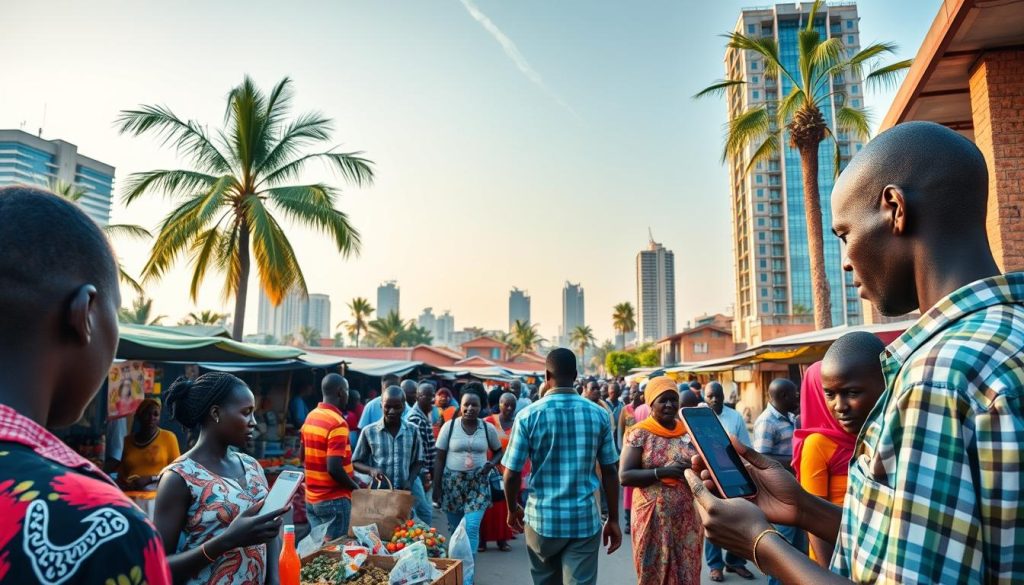
Mobile Money and ATMs
Mobile money solutions are emerging as a convenient way to handle transactions. Services like MTN Mobile Money and Zain Cash allow you to send and receive funds using your phone. These platforms are particularly useful in areas where ATMs are scarce.
However, ATMs are primarily located in urban centers like Juba. They dispense only the South Sudanese pound, and their reliability can vary. Always carry some cash as a backup, especially when traveling to rural areas.
Overcoming Limited IT Infrastructure
Limited internet access and poor telecommunications infrastructure are common challenges. Many rural areas lack reliable connectivity, making digital payments difficult. In such cases, cash remains the most practical option.
Here are some tips for safely managing digital payments:
- Use trusted apps: Stick to well-known mobile money platforms to avoid scams.
- Monitor your balance: Regularly check your account to ensure no unauthorized transactions occur.
- Carry backup cash: Always have some local currency on hand for emergencies.
“Digital payments are transforming the financial landscape, but cash remains king in many parts of the country.”
By understanding these payment options and their limitations, you can navigate South Sudan’s financial landscape with confidence. Whether you’re using mobile money or relying on ATMs, these insights will ensure a smoother experience.
Safety, Security and Legal Considerations in Currency Handling
Ensuring your financial safety while traveling is as important as planning your itinerary. Handling money in a new destination requires awareness of potential risks and local regulations. By staying informed and vigilant, you can protect yourself from fraud and theft while adhering to legal requirements.
Preventing Fraud and Theft
Fraud and theft are common concerns when handling money abroad. Crowded marketplaces and banks are hotspots for pickpockets, so always keep your belongings secure. Use a money belt or hidden pouch to store cash and important documents like your passport.
When exchanging currency, stick to reputable bureaus or banks. Avoid street vendors offering deals that seem too good to be true. Scams often target travelers unfamiliar with local rates. Always count your money carefully before leaving the counter.
In case of emergencies, such as needing water or other essentials, carry a small amount of cash in a separate pocket. This ensures you’re prepared without exposing your main funds to risk.
Local Laws Affecting Transactions
Every destination has unique laws governing financial transactions. In some places, it’s illegal to carry large amounts of cash or use unofficial exchange services. Research local regulations before your trip to avoid legal issues.
For example, certain countries restrict the import or export of their currency. Always declare large sums of money at customs to comply with legal requirements. Ignoring these rules can lead to fines or confiscation of funds.
Economic conditions can also impact currency safety. In unstable economies, exchange rates may fluctuate rapidly, increasing the risk of financial loss. Stay updated on local news and consult trusted sources for advice on managing your money.
Here are some practical tips to enhance your financial security:
- Use secure methods: Opt for prepaid travel cards or mobile money apps to minimize cash handling.
- Stay vigilant: Be cautious in crowded areas and avoid displaying large sums of money.
- Know the laws: Familiarize yourself with local regulations to ensure compliance and avoid penalties.
“Financial safety is not just about protecting your money—it’s about ensuring peace of mind during your travels.”
By following these guidelines, you can navigate the financial landscape of your destination with confidence. Whether you’re exchanging currency or shopping in local markets, these tips will help you stay secure and compliant.
Practical Tips from Local Experts and Tour Companies
Local experts and tour companies can be your best allies when navigating the complexities of travel in this region. Their firsthand knowledge and experience can help you overcome challenges and make the most of your journey. Whether you’re dealing with bureaucratic hurdles or seeking hidden gems, their guidance is invaluable.
Leveraging Local Guidance
Engaging with local guides and tour companies can significantly enhance your travel experience. They offer insights into the best places to eat, ensuring you enjoy authentic food while staying safe. For instance, in the capital, Juba, local experts can recommend restaurants that cater to international tastes while maintaining hygiene standards.
Local guides also provide practical advice on health precautions, such as ensuring your vaccination records are up-to-date. This is especially important in areas where medical facilities are limited. Their knowledge can help you avoid common pitfalls and focus on enjoying your trip.
Here are some benefits of working with local experts:
- Access to hidden gems: Discover off-the-beaten-path attractions that aren’t in guidebooks.
- Safety assurance: Navigate unfamiliar areas with confidence, knowing you’re in safe hands.
- Cultural immersion: Gain deeper insights into local traditions and customs.
Managing Bureaucratic Hurdles
Bureaucratic challenges, such as obtaining permits and visas, can be daunting. Local tour companies often have established relationships with authorities, making the process smoother. For example, they can assist with the vaccination documentation required for entry, ensuring you meet all legal requirements.
In the capital, Juba, these companies can also help you navigate local regulations, such as currency exchange rules. Their expertise ensures you comply with laws while avoiding unnecessary delays or fines.
Here are some strategies to manage bureaucratic hurdles:
- Plan ahead: Start the visa application process early to avoid last-minute stress.
- Use trusted services: Rely on reputable tour companies for assistance with permits and documentation.
- Stay informed: Keep up-to-date with local regulations to ensure compliance.
“Working with local experts not only simplifies your travel logistics but also enriches your overall experience.”
| Service | Benefits | Examples |
|---|---|---|
| Local Guides | Cultural insights, safety assurance | Recommendations for authentic food and attractions |
| Tour Companies | Bureaucratic assistance, logistical support | Help with visas, permits, and vaccination requirements |
By leveraging local expertise, you can overcome challenges and enjoy a seamless travel experience. Whether you’re exploring the capital or venturing into remote areas, their guidance ensures a memorable and stress-free journey.
Cultural Etiquette and Money Management Abroad
Understanding cultural etiquette is essential for a smooth and respectful travel experience. Navigating a new culture requires awareness of local customs, especially when handling money. By respecting traditions and managing finances discreetly, you can build positive interactions and avoid misunderstandings.
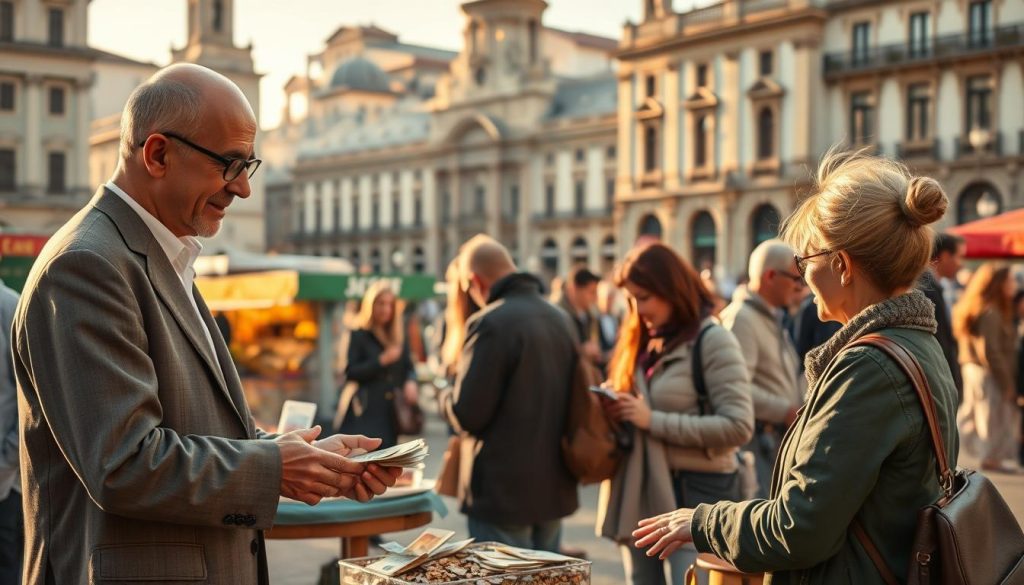
Respecting Local Customs
When visiting a new place, respecting local customs is key to building trust. Dress modestly, especially in rural areas, to show cultural sensitivity. Greetings are also important—learn a few phrases in the local language to make a good first impression.
Understanding payment customs is equally crucial. In some communities, negotiations are expected, while in others, fixed prices are the norm. Always ask politely and avoid aggressive bargaining. This approach not only shows respect but also helps you secure fair deals.
Interacting with Vendors
Interacting with vendors requires a balance of politeness and assertiveness. Start with a friendly greeting and take time to understand the product or service. If negotiating, offer a fair price rather than pushing for the lowest possible cost.
Managing money discreetly is vital to avoid unwanted attention. Use a money belt or hidden pouch to keep your cash safe. Avoid displaying large sums in public, especially in crowded markets. This practice ensures your financial security while maintaining a low profile.
“Respecting local customs and managing money wisely are the cornerstones of a successful travel experience.”
Here are some practical tips for navigating cultural nuances:
- Dress appropriately: Follow local dress codes to show respect for cultural norms.
- Learn basic greetings: A simple “hello” in the local language can go a long way.
- Carry small bills: This makes transactions easier and reduces the need for change.
- Be discreet with money: Avoid flashing cash or valuables in public spaces.
By following these guidelines, you’ll not only enhance your travel experience but also foster positive relationships with locals. Whether you’re making an entry into a new community or handling your passport at checkpoints, cultural awareness ensures a seamless journey.
Conclusion
Exploring a new country’s financial system can be both challenging and rewarding. This guide has walked you through the essentials, from understanding the local currency to navigating payment methods. Preparation is key—whether it’s budgeting for daily expenses or respecting local customs.
Working with a reliable company can make your journey smoother. They provide valuable insights and help you plan for the travel season. Timing your trip during the right season ensures better weather and easier access to attractions.
Traveling here offers unique rewards, from cultural immersion to unforgettable experiences. However, it also comes with challenges. Staying informed and adaptable will help you overcome any hurdles.
Take these insights with you as you plan your adventure. Share your experiences and encourage others to explore this vibrant destination. With the right preparation, your trip will be both enriching and memorable.
The above is subject to change.
Check back often to TRAVEL.COM for the latest travel tips and deals.
